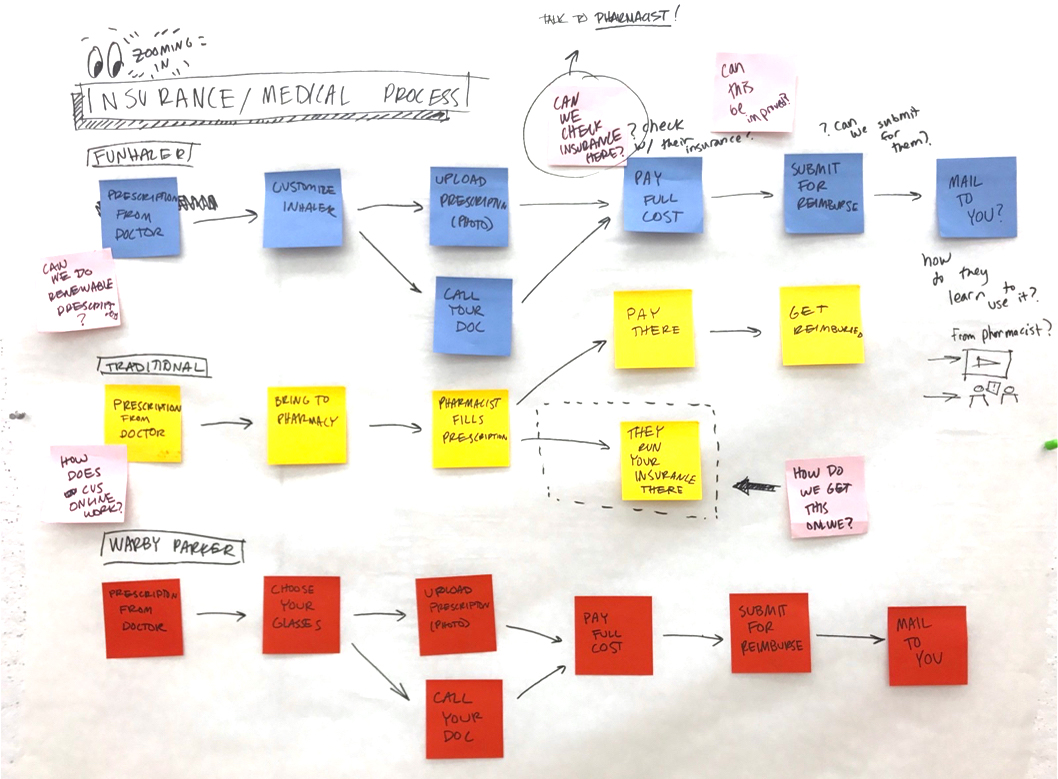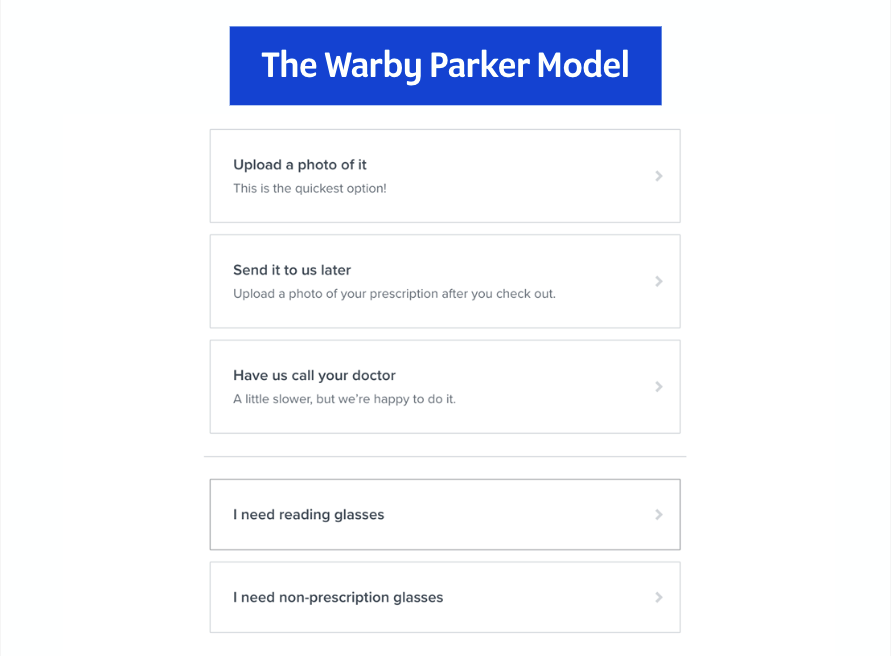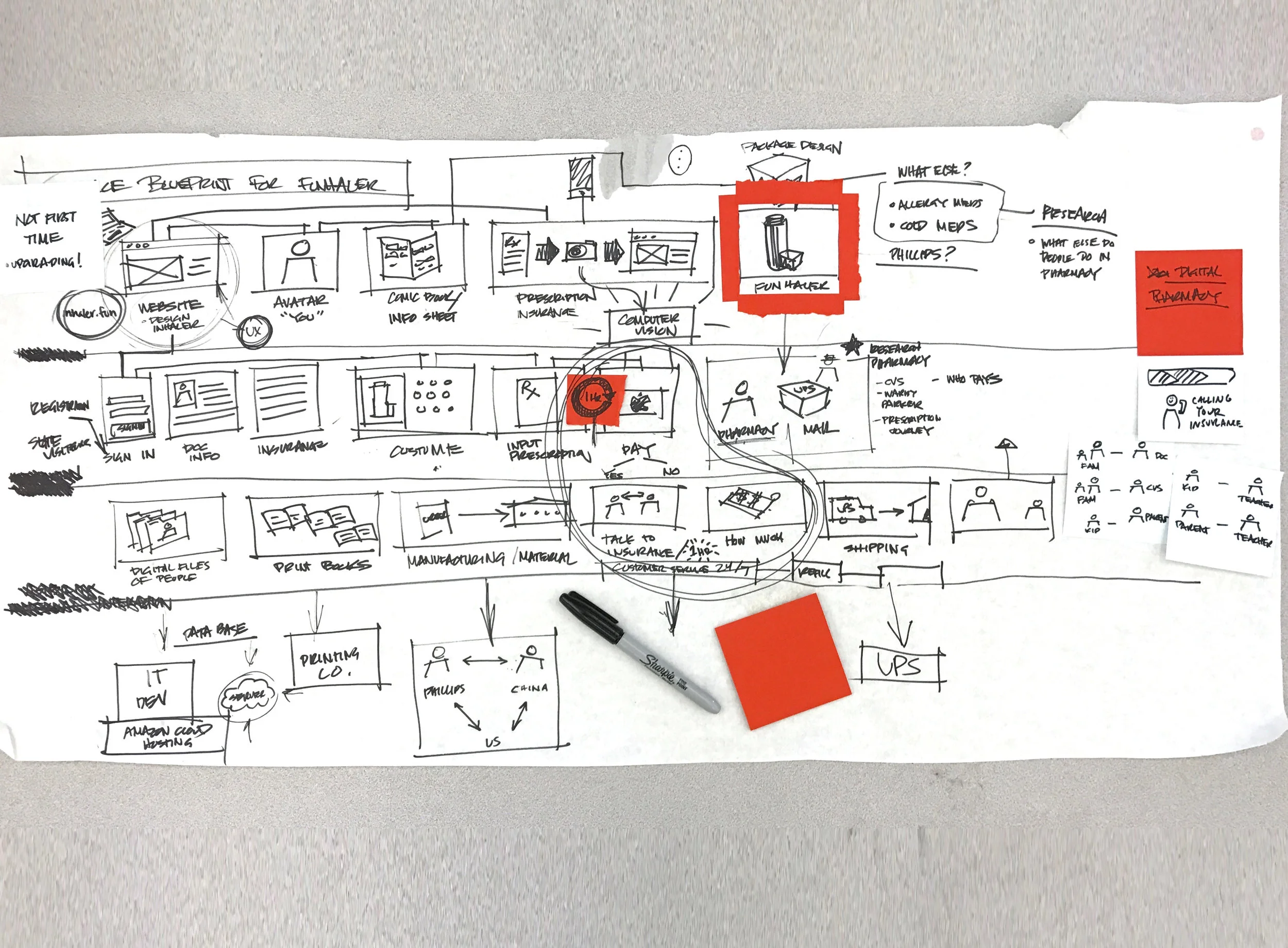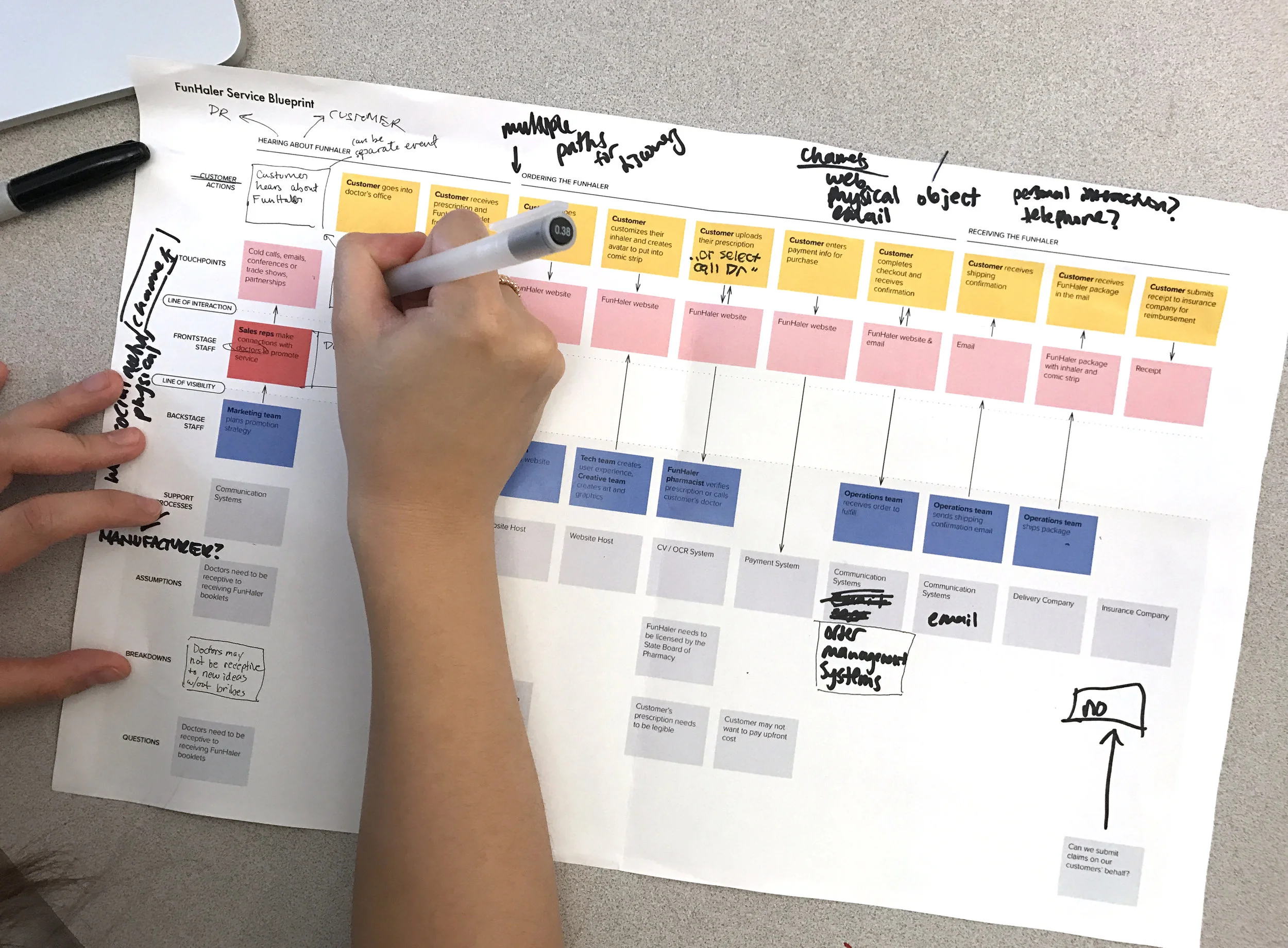
Philips: FunHaler

Funhaler
Funhaler is a service design exercise in destigmatizing asthma through a creative outlet for asthmatic children to customize their personal inhaler
Spring 2017 — 8 weeks
Partners: Adena Lin, Caroline Hermans, Jesse Wilson, and Joy Xiaonan
Skills: Research, Service Blueprinting and Diagramming, Storyboarding, Video Sketch
In the United States, 1 in 10 children suffer from asthma. In addition to medical problems such as difficulty breathing and even trips to the emergency room, it can also cause social problems such as embarrassment and isolation due to missing school and sitting out on sports. For a semester, my team sought to design a solution that can support children (4–10 years old) in the transition from parental to self-management.
This project was done in partnership with Philips Healthcare as our client.
Meet 8 Year-Old Mia and her Funhaler story!

Asthma Research
Understanding the Problem Space:

With little knowledge about asthma, our team wanted to understand:
- What are the consequences of having asthma? How are the stakeholders involved affected?
- Do caretakers understand how to best support children in managing their asthma?
- Do children understand the amount and types of activity they can engage in, without causing an asthma attack?

Secondary Research
Our first step was to learn more about asthma through secondary research. We looked into major issues that children with asthma may be dealing with. We identified several major categories for research:
- Daily Restrictions and Social/Emotional Impact
- Medication and Medical Issues
- Child's Point of View
- Caregiver's Point of View
- Triggers + Management
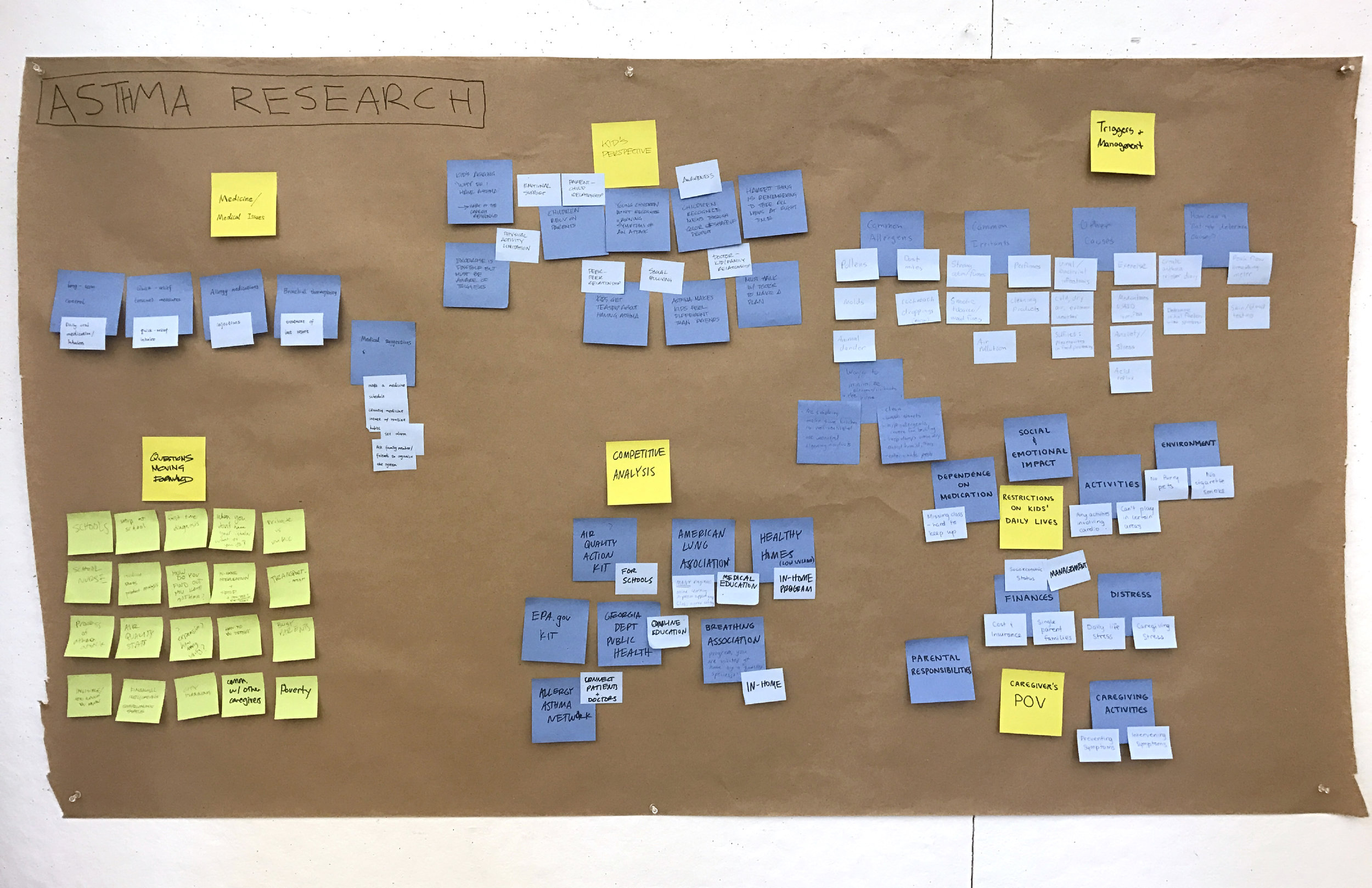

Stakeholder Interviews and Journey Map
We made a point to speak to as many stakeholders as possible to understand the problem space. Through the 14 interviews we conducted, we developed insights about children and asthma management.
As we clustered our research findings, we also created a journey map from the kid's perspective and identified the breakdowns and possible opportunities along the journey.

Key Insights
1. Children with asthma can feel isolated
"I'm always so embarrassed by my inhaler. I feel left out of certain events because I have asthma."
— Alyss, patient
2. Awareness and education for parents and children are important
"I just wanted a miracle pill for my kid. We never really reached out to anyone, asthma was always something you just had to deal with."
— Lee, parent
3. Kids with asthma are just kids
"The inhaler is very scary for some kids, so I put google eyes and I stuck some feathers on an inhaler, and I made it into a finger puppet."
— Emma, teacher
Service Design Opportunity
How can we provide social and emotional support to empower children with asthma?
As we synthesized all our findings, we found that kids with asthma at school were suffering from emotional isolation and misunderstanding, but there were almost no relevant service in the market to support them in such way. Therefore, our team decided to focus on providing emotional support to normalize asthma and give the kids chances to "shine" in the classroom.

Breaking an arm isn’t fun. But because the symbol of a broken arm is “cool”, having a broken arm isn’t emotionally so bad compared with asthma medication.
Concept Ideations
- Medical : Data tracking to improve diagnoses and prescriptions
- Emotional Support: Provide comfort and consultation for parents
- Social Support: Transform perception of asthma to deal with child exclusion
- Communication: Effective communication channels between kid, parent, school, and doctor
Concept 1: AsthmAcademy — Increase asthma awareness at school
(Communication)
A non-profit consultancy that goes into schools and works with students and teachers to increase awareness of asthma with the aim of demystifying and normalizing it.

Concept 2: Funhaler — Custom Inhaler to make asthma and the kids "cool"
(Emotional Support)
FunHaler is a website service which allows children and their parents to custom design their own inhalers. The service would include the creation of a comic that features the child with their customized inhaler, emphasizing the “superpowers” that the child and inhaler have.

For the first concept, we realize that the numbers of students in any given school with asthma may be low and thus reduce the need for this service, however this concept need not be limited to asthma. Based on feedbacks from our professor and peers, we decided to pursue the FunHaler idea further!
Service Blueprint and Touchpoints
We completed a service blueprint in order to explore the behind-the-scenes and bird's eye view of how this service could actually work.
What about Health Insurance?
Understanding health insurance was a big challenge for us. Even a doctor we spoke with cautioned us that this would be a tricky problem to deal with. Traditionally prescription inhalers are picked up in-person at a pharmacy, which handles the whole process. We asked, “how could this successfully be implemented online?”
We discovered that Warby Parker’s model is very in line with what we could do for our service, however, it lacks the ability to communicate with your insurance before purchasing. This means you have to pay full price, and be reimbursed by insurance later. Due to time limitation, we were not able to speak to pharmacists and people who know more about the insurance business. However, through Warby Parker, our basic insurance flow is supported.
Our touchpoints start with the (1) info pamphlet or pop-up shop, (2) website, and (3) Funhaler itself. After discussing and figuring out the roadblocks, we prototyped them.

Funhaler Workshop
How do we know if it's fun? To test out the ideas, we created blank, 3D printed inhalers. With them, we ran an inhaler decorating workshop! We brought a ton of craft supplies and prompted students to create their own designs and tell us what they think about asthma. We sat back and watched what everyone came up with.


UX, Visual Design, and Video Process
Due to time limitation and the service nature of this project, we didn't spend too much time on website design but instead delivered a framework and flow to make sure the process is understandable.
Since the website is facing children and their parents, we made the layout and process as simple as possible.

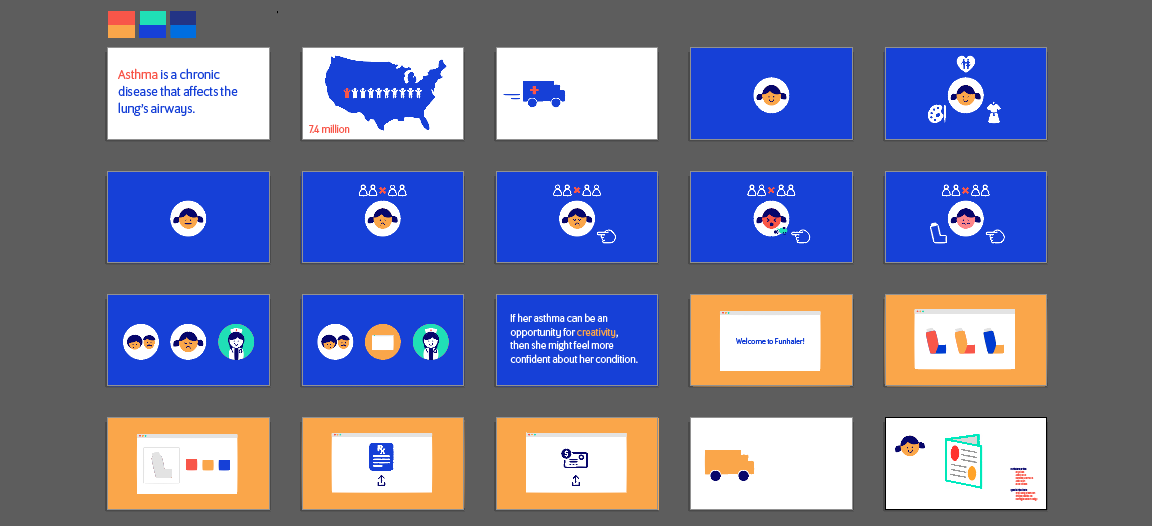
Presentation to Philips

Presenting to our client panel from Philips

Funhaler Team: Caroline, Joy, Adena, me, Jesse
Value
- An easy way for parents and kids to get medication they need right at home
- Kids can avoid the scary and uncomfortable experience of going into, and waiting at, a pharmacy
- A way to empower kids so that they can celebrate their difference instead of being ashamed of it
Reflection
- We need to validate with children!
- Health insurance is still murky and needs to be figured out to ensure that this service is viable
- It'd be beneficial if we could measure or track the emotional impact that this has on children and their parents

